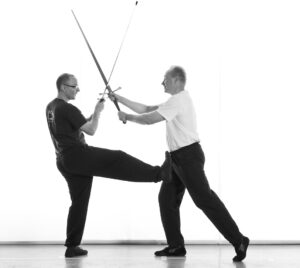
Are testicles really an advantage in a sword fight?
I first met the illustrious Christian Tobler in 2003. We were sat chatting about something and I casually called him “Chris”. He politely replied “it’s Christian, actually”, and with a modicum of effort, I stopped shortening his name, and have called him Christian ever since.
If he’d asked me to call him Christina, I’d have done the same.
This is basic politeness. Unless somebody asks you to call them something that puts you in an awkward position (somebody you don’t really like wanting you to call them “darling snookums”, for instance; or somebody who is not your boss demanding to be called “Boss”, for another instance), the only reasonable thing to do is respect their wishes about how they are addressed.
Y’all can call me “Jedi Master Guy the living sword god” if you want. Go on, I dare you.
We have had a small number of transgender people in one or other branches of my School over the last 15 years. In every case, School policy is absolutely clear: respect their preferences. It really doesn’t matter a damn whether the person you are training with is male, female, trans, or even (gods protect us) Swedish. It matters what their weapon is doing and why.
Likewise, within the school, our tournaments are not segregated in any way. If you are smaller or weaker, or taller, or stronger, you are expected to deal with it as best you can and learn from the experience. That’s it. Weapons do not discriminate and neither should we. In our most recent tournament, students even had a free choice of weapon (axe, spear, sword, dagger or unarmed); the best fight of the day was one student with a dagger defeating another with a pollax. You gain honour in direct proportion to the difficulty of the fight.
I understand that there is an argument made regarding high-level competition having gender categories, and a stated policy regarding what is required to gain admission to one category or the other. With millions of dollars on the line, it makes a sort of sense, I suppose. And in some arts, such as MMA or wrestling, weight categories make sense. But in combat of any kind, they just don’t strike me as martial.
This is topical because a student of mine has recently been denied entry to the women’s longsword tournament at an event in the USA. This student has gone through all sorts of difficulties to become who she is meant to be; it seems perverse to me to add to those difficulties deliberately.
This is the whole point of training swordsmanship. You start out wanting to be something that you are not (yet): A swordsman. You train, and sweat, and bleed and suffer (in my classes, anyway), and through the alchemy of practice you become the person you aspire to be. For any swordsman to fail to see the similar but vastly more difficult course that trans people go through strikes me as a pathetic failure of imagination and empathy.
Training is all about personal growth, and respecting the efforts that our fellow students make to grow, in all aspects of their lives.
Frankly, I don’t care what you think about a transperson’s gender. The only polite and decent course is to respect their choice regarding how they are identified, and to respect the courage it has taken them to live as they do in a world so sadly full of people who are quick to judge.
